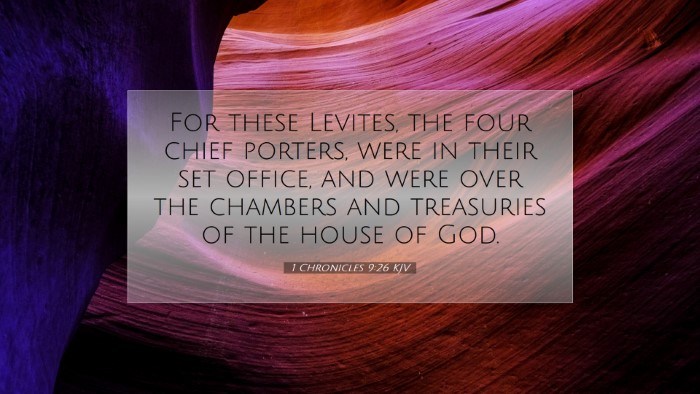Commentary on 1 Chronicles 9:26
Verse Context: 1 Chronicles 9:26 states, "For these Levites, the four chief porters, were in their set office, and were over the chambers and treasuries of the house of God." This verse highlights the role of Levites in the temple services, emphasizing their responsibility and the structure of worship during the time.
Overview and Significance
The passage reveals the organization of the priestly and Levitical duties within the temple, portraying their importance in preserving sanctity and order. The Levites, set apart for service, were responsible for various roles including guarding the doors and managing the treasures of the house of God.
The Role of the Levites
In examining the responsibilities of the Levites, we can see their multifaceted role in the spiritual life of Israel. They were not only caretakers of the temple but also played a significant part in worship and the maintenance of the covenant relationship between God and His people.
- Guardians of Sacred Space: The Levites served as porters or gatekeepers, ensuring that only the proper individuals could enter the sacred areas. This task underscored the holiness of the temple and the need for purity and separation from the common world.
- Custodians of Worship: Their management of offerings and treasures shows the importance of integrity in handling sacred items and resources. Their faithfulness in this duty reflects the divine expectation of stewardship.
- Facilitators of Liturgical Order: By keeping watch over the chambers and ensuring that the services were carried out in order, the Levites helped maintain a proper ambiance for worship, enabling the congregation to focus on their relationship with God.
Commentary Insights
Matthew Henry notes the significance of the Levites’ role, emphasizing their importance in the theocratic system instituted by God. He explains that the Levites were chosen for their service; thus, their devotion is evident in their commitment to their sacred tasks.
Albert Barnes adds that the designation of “four chief porters” indicates a hierarchy and structure within the Levites' service. This arrangement provides insight into how worship was not only spiritual but also organizational - a model for contemporary church structure.
Adam Clarke further elaborates that the Levites' service was one of honor and responsibility. They were seen as vital conduits for the presence of God among His people, serving not just in the physical temple but as a representation of God’s ongoing relationship with Israel.
Theological Implications
This verse invites deeper reflection on the holiness and sanctity of worship, calling leaders and congregants alike to take their roles seriously within the body of Christ. Just as the Levites were tasked with protecting the integrity of the temple, church leaders today are called to uphold the sanctity of worship environments.
Moreover, the Levites' service foreshadows the New Covenant ministry, where believers are called to be a royal priesthood (1 Peter 2:9). Each member plays a crucial part in facilitating worship and extending God’s grace and presence to the community.
Lessons for Today’s Church
- Service and Responsibility: Emphasizing the importance of dedicated service in the church, similar to the Levites, encourages a robust understanding of what it means to belong to the body of Christ.
- Integrity in Stewardship: The Levites' handling of treasures and offerings serves as a reminder of the importance of integrity in financial matters within the church.
- Holiness in Worship: The call to maintain holiness and purity in worship settings can direct modern practices of reverence and respect within church life.
- Community and Collaboration: The organization of roles among the Levites illustrates the significance of teamwork and collaboration in ministry, promoting a unified approach to service.
Conclusion
1 Chronicles 9:26 serves as a rich resource for understanding the vital role of the Levites in the history of Israel's worship and their enduring legacy in the Christian community today. It captures both the structure and spirit of service, inviting contemporary believers to reflect on their calling and contribution to the body of Christ.


